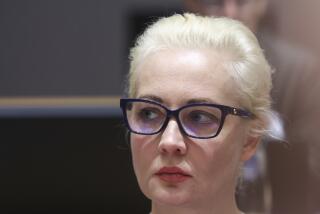Struggle Goes On, but World May Not Be Watching : Soviet Union: A Fullerton woman tries to make sure the United States doesn’t lose sight of the Baltic states’ independence movement.
- Share via
WASHINGTON — The bombs and missiles relentlessly falling on Iraq, Saudi Arabia and Israel fill Angela Nelsas’ heart with a double sense of dread.
The Fullerton activist’s first concern is for the soldiers and citizens of her adopted country, the United States. But her second thought is of the potential for disaster in three small, struggling republics thousands of miles from the Middle East.
“It seems all the attention is now on the gulf,” said Nelsas, who was born Angele Barkauskas in what before World War II was the independent republic of Lithuania. “And that makes me frightened to death that this will give the Soviets the opportunity to move against Lithuania without so much attention.”
Nelsas, who still speaks with a pronounced Lithuanian accent, is the president of the Baltic American Freedom League, a 10-year-old, Los Angeles-based organization dedicated to freeing Lithuania, Latvia and Estonia, the three Baltic states seized by Joseph Stalin in 1940.
Nelsas, a middle-aged woman who favors conservative suits and gold earrings, hardly looks the part of a political firebrand. But she spent four months in Washington last spring pushing the Baltic cause, and returned last week for another round of lobbying Congress and the White House for a tougher U.S. response to the Soviet crackdown on the popularly elected governments of Lithuania and Latvia.
Two separate confrontations with Soviet troops have left at least 14 dead in Lithuania, five dead in Latvia, and scores injured.
Nelsas, who has lived in Orange County for 28 years with her husband, a business executive, is not alone in her concern that the outbreak of war in the Persian Gulf will divert the world’s attention from the trouble in the Baltics.
At a hearing last week, members of the congressional Commission on Security and Cooperation in Europe, commonly known as the Helsinki Commission, voiced similar concerns, as Nelsas and dozens of others looked on.
“This is typical of what the Soviets did in 1956, when they used the cover of the Suez crisis to move into Hungary,” said Sen. Alphonse M. D’Amato (R-N.Y.).
“The Administration has acted to staunchly oppose the occupation and annexation of Kuwait by Saddam (Hussein),” said Rep. Don Ritter (R-Pa.). “Now, Congress and the Administration must begin to act--not just talk--to stop the same international injustice in Lithuania and the other Baltic nations.”
The attacks by Soviet forces a week ago in Vilnius, the Lithuanian capital, and Sunday in Riga, the capital of Latvia, are only the latest pieces of evidence that the United States must take an unblinking stand against Soviet President Mikhail Gorbachev if the Baltics ever are to be free, said several congressmen and Nelsas’ organization. Gorbachev has said only that Soviet troops are responding to calls to restore order from citizens of the Baltic states.
“The President is saying that it’s unacceptable that Iraq occupied Kuwait. The same thing happened to Lithuania 50 years ago,” Nelsas said. “We feel that this whole crackdown and the bloodshed was really programmed to coincide with events in the gulf.”
Nelsas was one of 14 Baltic-American leaders who met last April with President Bush to encourage a U.S. push for Baltic independence. She was at the White House again last week, this time to meet with National Security Council staff members.
While the group has been disappointed by the White House’s response to its pleas, Nelsas said she believes she is making headway in Congress, where moves are afoot to provide direct aid to the beleaguered Lithuanian government and to push for suspension of credits for Soviet agricultural purchases.
Congress may begin considering legislation to punish the Soviet Union for its attacks in the two Baltic Republics as early as this week. Several representatives credit Nelsas and her organization with keeping the issue on the front burner.
“She’s terrific,” said Rep. Robert K. Dornan (R-Garden Grove), a member of the House Armed Services Committee.
Rep. Christopher Cox (R-Newport Beach), an expert on Eastern Europe who traveled through Lithuania last year, said Nelsas and the Baltic American Freedom League have played a significant role in educating members of Congress and the public about the plight of the Baltic states.
But Nelsas wants to do more than educate. The organization’s immediate goal is securing emergency medical aid for Lithuania, Latvia and Estonia, where medical supplies were depleted by a Soviet embargo last year. In addition, the group wants to enlist the help of Congress in persuading President Bush to cancel the planned February summit meeting with Gorbachev in Moscow in protest of the crackdown in the Baltic states. And Nelsas wants the President to dispatch a high-level diplomatic delegation to the Baltics, with the hope of preventing further bloodshed.
“We will not give up,” she said. “We have fought for 50 years, and we will not give up now.”
Nelsas is all too familiar with the history of Soviet oppression in the Baltics. As a young girl in 1944, she fled Lithuania with her parents and two sisters as Soviet troops marched into the country for the second time, displacing the Germans who had occupied the country for more than three years.
Nelsas’ father, Kipras, had discovered his name on a list of Lithuanians scheduled to be deported to Siberia. A breeder of riding horses, Kipras Barkauskas, with his family and four horses, made his way into East Prussia and lived in the German countryside until the end of the war.
Angela Nelsas’ grandparents were not so lucky. They were captured by Soviet soldiers invading Germany, and were sent to Siberia, where they died, Nelsas said. She said her aunts spent 15 years in Siberian labor camps before they returned to Lithuania.
After the war, the Barkauskas family lived in “displaced person” camps in Germany. Finally, in 1950, the family received permission to immigrate to the United States, eventually settling in Chicago. There, she met Ronald Nelsas, who became a successful warehousing executive. The couple moved to Orange County in 1962, and became the parents of three daughters.
Nelsas’ activism began in a small way. She worked with a Lithuanian relief organization, and for 10 years taught Lithuanian history and culture at a “Saturday school” at St. Casimir Lithuanian Catholic Church in Los Feliz, one of the largest Lithuanian parishes in Southern California. A longtime official in a national cultural support group called the Lithuanian American Community, Nelsas joined the Baltic American Freedom League three years ago and became president last March.
“I felt a commitment to help my aunts, who are still there,” she explained. “When the blockade was imposed on Lithuania last year, my aunts (who are diabetic) did not have the necessary insulin, this after 15 years in Siberia,” Nelsas said. “I just think the world needs more commitment from everybody. Although my home is here, my family and my roots are still in Lithuania.”
Last year, Nelsas said she spent almost as much time in Washington as she did in California. And she may find herself here again for much of 1991.
Her husband, she said, “is trying to be very patient. It is trying for him. But he is very supportive. And without the support of my family, I could never have done it.”
Meanwhile, she said, time is running out.
“It is our apprehension,” she said, “that unless our President and the Congress come forth with a very strong position, that the Soviets will take the last steps in this crackdown . . . coinciding with the Gulf (War).”
“We would like to see our government prevent further bloodshed.”
More to Read
Sign up for Essential California
The most important California stories and recommendations in your inbox every morning.
You may occasionally receive promotional content from the Los Angeles Times.













